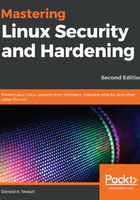
Locking the root user account
The cloud is big business nowadays, and it's now quite common to rent a virtual private server from companies such as Rackspace, DigitalOcean, or Microsoft Azure. These can serve a variety of purposes:
- You can run your own website, where you install your own server software instead of letting a hosting service do it.
- You can set up a web-based app for other people to access.
- Recently, I saw a YouTube demo on a crypto-mining channel that showed how to set up a Proof of Stake master node on a rented virtual private server.
One thing that these cloud services have in common is that when you first set up your account and the provider sets up a virtual machine for you, they'll have you log in to the root user account. (It even happens with Ubuntu, even though the root account is disabled on a local installation of Ubuntu.)
I know that there are some folk who just keep logging in to the root account of these cloud-based servers and think nothing of it, but that's really a horrible idea. There are botnets, such as the Hail Mary botnet, that continuously scan the internet for servers that have their Secure Shell port exposed to the internet. When the botnets find one, they'll do a brute-force password attack against the root user account of that server. And yes, the botnets sometimes are successful in breaking in, especially if the root account is set with a weak password.
So, the first thing that you want to do when you set up a cloud-based server is to create a normal user account for yourself and set it up with full sudo privileges. Then, log out of the root user account, log in to your new account, and do the following:
sudo passwd -l root
I mean, really, why take the chance of getting your root account compromised?